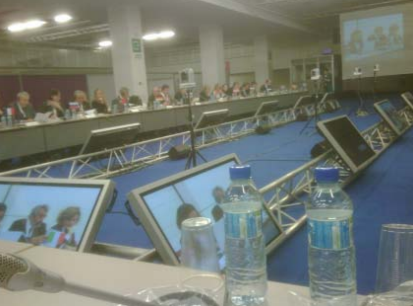
The EU has a long tradition of mutual support in disasters and some of the world’s easiest border-crossing formalities. Nevertheless, the conviction that steps are needed to improve EU member states’ preparedness to receive outside disaster assistance -- both from within and outside the EU -- appears to be growing. A series of events over the last two months focused on IDRL and “host nation support” (HNS) have given EU member states and National Red Cross Societies the opportunity to examine potential scenarios and the strengths and weaknesses of current regulatory systems.
On September 15-17, the Belgian Presidency of the EU convened a workshop of EU members’ civil protection authorities to discuss HNS issues, including pre-emergency planning related to international relief actors, coordination, logistics and legal and financial issues. The IFRC was invited to present on its experience with the IDRL Guidelines and the EU IDRL Study (discussed below). Workshop participants concluded that “there is a consensus that legal issues still constitute a barrier to the free flow of assistance within Europe (and from third countries)” and recommended a number of steps that the Commission and member states should consider, taking the IDRL Guidelines and the EU IDRL study into account.
On October 5, the IFRC gathered 70 participants from 18 EU member state governments and 21 EU National Red Cross Societies in Brussels to build on the above discussions and to examine the detailed findings and draft recommendations of the EU IDRL Study. That study, begun in 2009, examined the regulatory frameworks for international disaster assistance at the EU level and in six case study countries. The case study projects were led by the National Societies of Austria, Bulgaria, France, Germany, the Netherlands and the United Kingdom. Participants again agreed that more work was needed to prepare EU member states for internatonal disaster cooperation. They also provided comments on the draft recommendations from the study, which range from improving information sharing about existing legislation to developing new rules at the national and EU levels. Those recommendations are now being finalized and will be published in the coming weeks.
On October 26, the 25th Meeting of the Directors-General for Civil Protection of the EU, the EEA and of Croatia, Turkey and the Former Yugoslav Republic of Macedonia again took up the issue of HNS. The IFRC was invited to report on the results of EU IDRL study and the earlier workshop. Participants affirmed the importance of HNS and IDRL and welcomed the Belgian Presidency’s decision to make them a priority. They also welcomed the findings of the EU IDRL Study. It was noted that the Belgian Presidency is currently finalizing negotiations on formal “Council Conclusions” regarding steps that member states and the Commission should consider taking in this area.